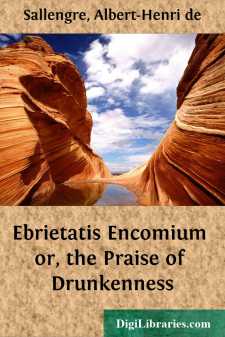Categories
- Antiques & Collectibles 13
- Architecture 36
- Art 48
- Bibles 22
- Biography & Autobiography 813
- Body, Mind & Spirit 142
- Business & Economics 28
- Children's Books 14
- Children's Fiction 11
- Computers 4
- Cooking 94
- Crafts & Hobbies 4
- Drama 346
- Education 46
- Family & Relationships 57
- Fiction 11829
- Games 19
- Gardening 17
- Health & Fitness 34
- History 1377
- House & Home 1
- Humor 147
- Juvenile Fiction 1873
- Juvenile Nonfiction 202
- Language Arts & Disciplines 88
- Law 16
- Literary Collections 686
- Literary Criticism 179
- Mathematics 13
- Medical 41
- Music 40
- Nature 179
- Non-Classifiable 1768
- Performing Arts 7
- Periodicals 1453
- Philosophy 64
- Photography 2
- Poetry 896
- Political Science 203
- Psychology 42
- Reference 154
- Religion 513
- Science 126
- Self-Help 84
- Social Science 81
- Sports & Recreation 34
- Study Aids 3
- Technology & Engineering 59
- Transportation 23
- Travel 463
- True Crime 29
Ebrietatis Encomium or, the Praise of Drunkenness
Categories:
Description:
Excerpt
CHAP. I.
THAT ONE MUST BE MERRY.
If on one hand I have reason to fear that the title of this book will offend the delicate ears of a great many, and make them say, that no vice ever wanted its advocate, Nullo vitio unquam defuit advocatus; I am not, perhaps, less exposed on the other to the criticisms of as many folks, who will probably apply to me that which was said heretofore to one in Lacedemonia, who had a mind to make an encomium on Hercules, viz. Who ever blamed Hercules?
Quis Herculem vituperavit?
However, though I should have no readers at all, yet am I resolved to continue my discourse at the hazard, in some manner, of imitating Pyrrho the philosopher, who one day, as he was haranguing the people, seeing himself abandoned by all his auditors, pursued very magnanimously his declamation to the end. To enter, therefore, upon the present subject, I lay down this as my first position, viz. That it is lawful to get drunk sometimes. Which I prove thus:—
Sadness is in the highest degree prejudicial to health, and causes abundance of distempers. There is no one ignorant of this truth. Joy (or mirth) on the contrary, prevents and forces them away. It is, as the Arabians say, the flower and spirit of a brisk and lively health. Let us run over, and examine all the different states of life, and we shall be forced to own, that there is not one of them all but what is subject to chagrin and sadness; and, consequently, that joy, or mirth, is most necessary to men. Which very probably the philosopher had in his head, when he defined man a risible animal. But be that as it will, one must certainly look upon that maxim which recommends mingling of pleasures with the affairs of life as a very wise one.
Sometimes with mirth and pleasure lard your cares.
We shall confirm this precept by a beautiful passage out of Seneca, whose writings most certainly contain no loose morality, and which is as follows:— “The soul must not be always bent: one must sometimes allow it a little pleasure. Socrates was not ashamed to pass the time with children. Cato enjoyed himself in drinking plentifully, when his mind had been too much wearied out in public affairs. Scipio knew very well how to move that body, so much inured to wars and triumphs, without breaking it, as some now-a-days do, with more than womanly pleasures; but as people did in past times, who would make themselves merry on their festivals, by leading a dance really worthy men of those days, whence could ensue no reproach, when even their very enemies had seen them dance. One must allow the mind some recreation: it makes it more gay and peaceful. And as it is not good too much to cultivate soil the most fertile, least, by yielding too large crops, it may soon run to decay and ruin: so in the same manner is the mind broken by a continued labour and application. Those who respite a little, regain their strength. Assiduity of labour begets a languor and bluntness of the mind: for sleep is very necessary to refresh us, and yet he that would do nothing else but sleep night and day, would be a dead man and no more....


